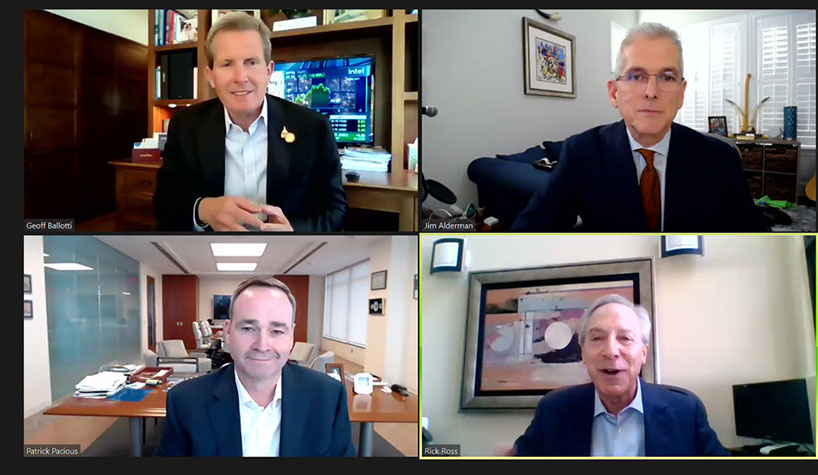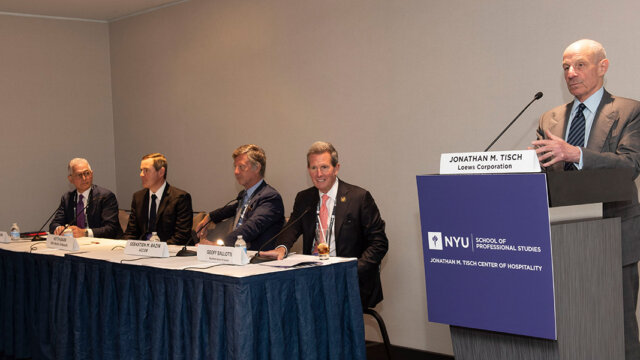NATIONAL REPORT—On the third day of the 42nd Annual NYU International Hospitality Industry Investment Conference, industry CEOs discussed the present and future of meetings and group business.
Moderated by Rick Ross, chair, global hotels and leisure, Dentons, the session called “CEOs’ Think Tank: Challenges and Opportunities Lodging Brands Face Now, and How Strong Leaders Are Addressing Both” featured panelists Jim Alderman, CEO, Radisson Hotel Group, Americas; Geoff Ballotti, president/CEO, Wyndham Hotels & Resorts; and Pat Pacious, president/CEO, Choice Hotels International.
When the multimillion-dollar question of ‘Will large groups and meetings return?’ was asked,
Ballotti responded, “Large groups have to come back. This cannot be a permanent change. We, as an industry, all need to continue to meet. We are seeing groups come back in [hotels like] our Wyndham Grand in Clearwater [FL] or our Dolce hotels are seeing the 100 to 200 [count meetings.] I would say the large group conferences have to come back because of the impact they have on our team members. Four million jobs in the industry have been lost to either furlough or permanent layoffs. The industry estimates that 1/3 to 1/2 of those jobs rely on the large group and meetings business.”
Pacious sees the meetings business changing following the impact of the pandemic to the industry.
“I think we’re kidding ourselves if we think [group business] is going to come back to the same place because I think you have to look at all the investment that businesses have made in virtual private networks, Zoom and Microsoft teams,” he said. “CFOs around the country are going to say ‘We made this investment. Do we really need to send people out on these long meetings?’ When business travel comes back in full, some of it may not return. I do think that’s something that we as an industry need to be thinking about and figuring out how to adapt the assets that we have to attract the business traveler of the future but also looking at new normal as we head into the future.”
Alderman agreed that it may come down to a financial decision on whether a group with travel to a meeting. “There are CFOs out there that are going to start to question things like, ‘OK. It’s a $500 flight. You got your time to the airport and your travel time. You got your hotel on the other end. So, is it worth a couple thousand dollars for this 45-minute meeting?,’’he said, adding, “There are very few franchise sales that can be made without a face-to-face meeting up front, maybe one or two in between and a face-to-face meeting on the close. Thankfully, that still has to happen. Those teams are driving. If they can’t they can’t fly, they drive.”
Ross asked the panelists if their normal entourage would travel to a large conference like NYU. Alderson was first to reply.
“When it comes to most of the people that will be attending the NYU conference, they would be on the development side. You can’t tell them no but if you tell them they have the option to attend, they’re going to be there,” he said. “Fortunately or unfortunately, some of them actually have the antibodies because they’ve already been through it, and the couple of them consider themselves superheroes. They’re taking three flights a day because they feel, ‘I’ve had this and now I can just travel robustly with a big S on my chest,’ which is a little bit frightening.”
Pacious noted that his people are anxious to meet face to face. “You still have some hesitancy on people’s part. Companies cannot force people to go, but our people who attend those conferences are eager to get there and see other people in the industry,” he said. “I’ve been down to see some of our owners in Florida who’ve opened a hotel, and other franchisees came to that event just to interact with our team. They drove to that site because we’re dying to see each other. You can only do so much over Zoom that you can’t really do when you’re actually fully present.
“That being said, you do have the financial element to this, and what I’m worried about is a lot of conferences are where our younger associates actually learn the business and they’re usually the last ones in,” he continued. “How do you get your younger associates exposure to those relationships that they need to build, and how do they get to understand our industry without truly spending some time? It’s those casual conversations that occur in the hallways and at the events that go on in the evenings that are missing in a Zoom-driven environment. The virus has taught us all how much we depend on each other both for being safe and socially distant, but it’s a reminder that—for this industry in particular—to thrive, we’ve got to get back to seeing each other on a personal basis…This is a this is an industry that lives off of that light blood of human connection.”

